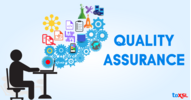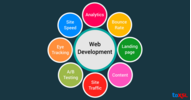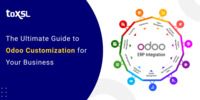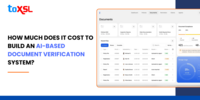- Jan 27, 2026
- ERP/CRM Applications
- 2361
Share this post on:
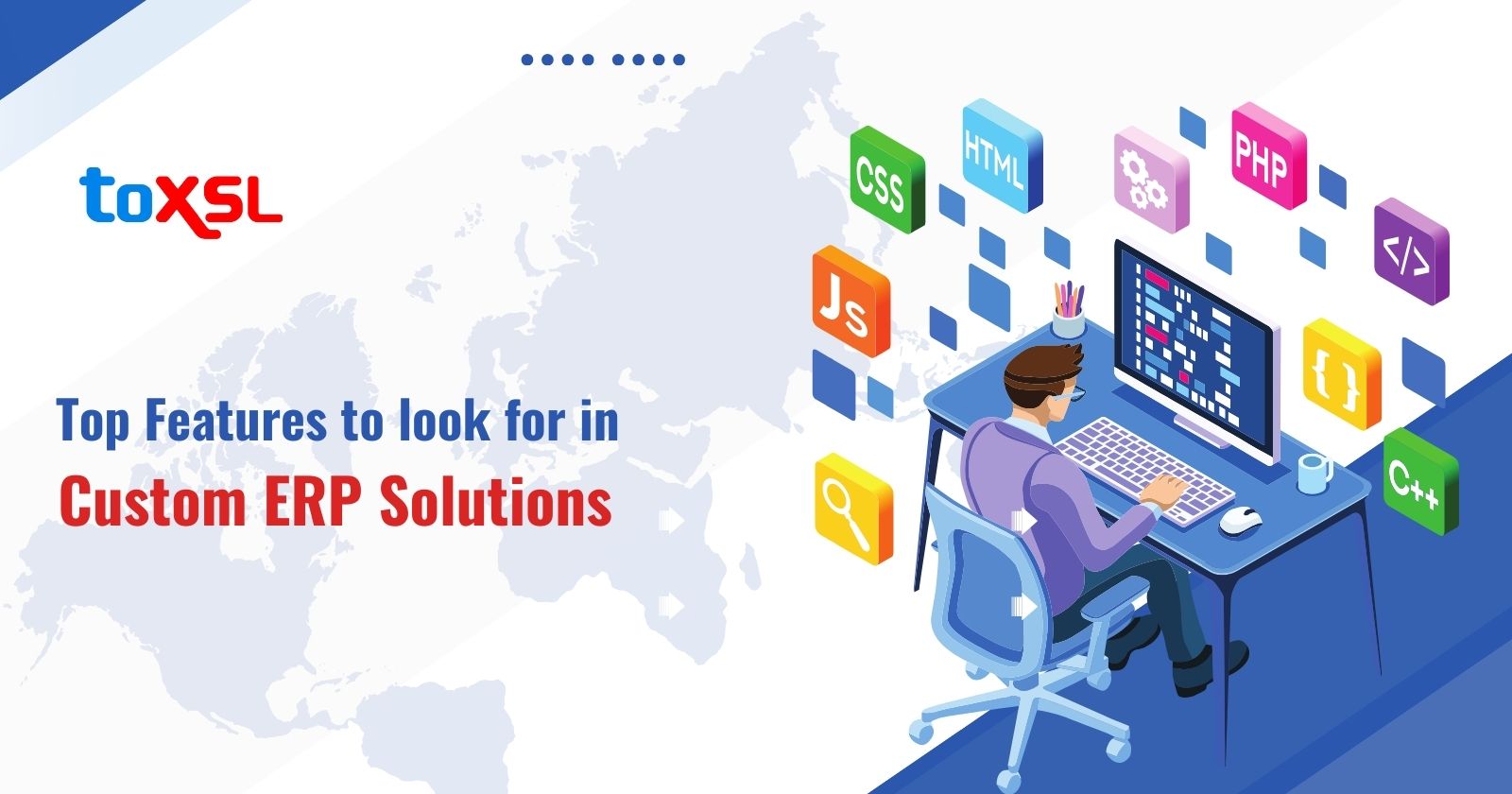
Over the past several decades, enterprise resource planning (ERP) systems have become vital for businesses. ERP software helps businesses achieve real-time visibility in their operations and streamlines cross-organizational data integrity, sharing, and collaboration. Enterprise resource planning (ERP) software supports a company’s technology stack and supports important functions including accounting, cash flow management, financial reporting, risk management, and data analysis
Let’s See What ERP Market Statistics Say:
• The global ERP market is estimated to reach $96 billion by 2032.
• The ERP market growth is expected to reach $32 billion by 2029.
• Industries such as manufacturing, information technology, and healthcare drive the ERP market.
• Businesses reported an increase in ROI after opting for ERP systems.
• The Asia-Pacific region is expected to expand at the fastest rate by 2032.
• The global ERP market is predicted to increase at a CAGR of 7% between 2025 and 2032.
• 50% of companies are upgrading to ERP systems.
• According to a survey, 26% of employees use the company’s ERP software.
ERP software is designed especially to handle core business operations across numerous departments, including finance, human resources, supply chain, and manufacturing. The features included in customized ERP systems vary as per business needs. However, there are general features that tend to be in most ERP versions. Let us dive deeper into the blog and learn more about ERP software.
What are the features of enterprise resource planning?
ERP features are the functionalities incorporated in ERP software. These features include procurement, accounting, order management, and supply chain management. The main purpose of ERP features is to automate tasks, improve insights, reduce operational costs, enhance efficiency, eliminate risk, and improve workflows, among other benefits.
Key Takeaways
• ERP software automates core business processes among various departments, helping businesses make informed decisions.
• ERP system incorporates features such as finance, procurement, human resources, and project management.
• The ERP system needs to be integrated with existing or specialized software for advanced functionalities related to analytics, marketing, and sales.
Key Features of ERP Systems
Are you looking to streamline your business processes? Wondering what features you should opt for as per your business tree? An enterprise resource planning system is here to help. However, the features of ERP software might vary to a greater extent. However, in general, the features of ERP software include a range of financial and operational capabilities, supporting common business tasks:
1. Financial Management: Financial management is an umbrella term for all standard accounting features. This includes payables and expenses, receivable and cash management, revenue recognition, budgeting, and lease management. To strengthen these core functions, Accounts Receivable Automation streamlines invoicing, payment tracking, and collections, helping organizations improve cash flow accuracy while reducing manual effort across financial operations.
2. Accounting: The accounting feature in an ERP system is a tool that manages cash flows, accounts receivable and payable, and invoice management. This feature helps businesses to pull data in from different sources, synthesize it, and store it in a central repository. The stored data can be easily used for reporting, analytics, and other crucial financial functions. The accounting feature makes it easier to connect finance data to operational processes, helping businesses improve decision-making.
3. Order Processing: Order processing is a feature that takes orders from customers. This feature allows businesses to manage the lifecycle of purchase orders, including initial order capture through billing, delivery, and payment. Order processing features in ERP systems simplify data management across various departments and pull data from numerous systems as required, helping ease data flow. This helps businesses automate and simplify data processes.
4. Project Management: Project management systems of an ERP system help businesses plan, execute, evaluate, and track projects. This feature has the ability to develop detailed project plans, such as tasks, milestones, and other dependencies. However, other key elements of project management include budget and cost-control functionality, collaboration, risk management, and other analytic tools, helping businesses assess progress, identify bottlenecks, and make data-driven decisions.
5. Embedded AI: AI has been proven to be a game changer in ERP systems. Nowadays, top ERP systems are using artificial intelligence in the software, helping them automate or speed up specific finance and operational tasks. For example, an AI-powered chatbot can guide employees by submitting an expense report via mobile phones, allowing them to take a picture of the receipt. Also, advanced generative AI capabilities are being used to develop narrative descriptions to help conclude financial reports.
6. Real-time Data: Real-time data in ERP software allows businesses to identify changing business conditions and strategies and helps them make informed decisions. Traditionally, businesses used to do manual work to pull data, questioning data integrity and trust. However, ERP systems support and facilitate real-time data, allowing businesses to access data while maintaining trust.
7. Automation: ERP systems automate daily tasks. Automation helps businesses streamline their business processes with little human intervention, reduce manual work, minimize human errors, and improve business efficiency. The most common automated processes in an ERP system include order fulfilment, inventory, and financial management, including invoice generation, expense tracking, reporting, and more.
8. Data Analytics: ERP systems include core reporting and analytics capabilities, helping businesses gather data on business operations. The data analytics features are associated with ERP systems, including report generation, query tools, and dashboards. Data analytics help businesses make informed decisions, helping businesses grow.
9. Business Process Control: ERP systems optimize and automate routine tasks and processes. This helps businesses improve their operational efficiency, data accuracy, and risk management. Business process control includes tools that help leaders manage and define workflows and develop predefined approval processes.
10. Integration: The integration feature helps businesses connect one software application with another. These integrations allow business data to be shared between systems for improved decision-making and data consistency without transferring data manually. Integrations facilitate end-to-end business processes across departments and business units.
11. Single Database: A single database allows businesses to store entire data in a centralized location via one common data model. Also, data is accessible to employees across the organization without having to click through numerous systems. Also, employees do not have to wait for manual data transfer, reducing the risk of human error and lost information.
12. Customer Relationship Management (CRM): CRM is software that stores customer data, tracks their interactions, and manages marketing campaigns. However, it is not a standard feature of an ERP. Businesses can use ERP and CRM systems from different providers, linking them via integration.
13. Sales Management: Sales management helps businesses manage their customer relationships and optimize sales and improve overall sales performance. These features manage revenue operations, sales forecasting, quoting proposal generation, and sales territory. Integrating RFP automation into this process can streamline the creation and submission of proposals, reducing manual effort and ensuring faster, more accurate responses to potential clients.
Benefits of ERP Software For Businesses
ERP solutions are one-stop shops for streamlining and managing daily business operations. The businesses. This software offers numerous benefits to businesses globally. Here are a few of the benefits:
Enhanced Customer Service: We live in a highly competitive world. All businesses are trying to attract and retain customers. Hence, offering the best customer service experience is crucial for organizations. An ERP solution can help businesses have a great customer relationship. The ERP system stores contact information, order history, past support cases, and more in one system.
Customized Reporting: An ERP offers a real-time data reporting option, making it easy for businesses to tailor reporting across various functions, including finance, inventory, human resources, and more. Also, if you are trying to assess an issue, you can easily do it with real-time data with accuracy.
Improved Transparency: One of the benefits of ERP software is that it provides full access to every business operation in one place. This allows executive-level employees to access the information from any department and helps maintain transparency among all.
Get all the features you need with ToXSL Technologies
In this blog, we discussed the features of an ERP system in detail. Implementing an ERP system can significantly enhance your operational efficiency. Also, it provides a centralized platform for data management and process optimization.
However, developing customized ERP software requires careful consideration of the business’s unique needs. So, if you are looking to develop the best ERP software development company that can offer you the best ERP solution, look no further than ToXSL Technologies.
We are a leading ERP software development company offering businesses the most scalable and flexible ERP solutions, helping them streamline their business operations. We make sure that our clients get software solutions that smoothen processes, enhance profits, and keep them ahead of their competitors in the industry. With that, our team of experts ensures that our solutions not only meet your business requirements but also are scalable and can help you meet the challenges and attract the right opportunities that will help your business grow.
Get in touch with our experts today and tell us your most important business needs right now. We promise to offer the most scalable, secure, and flexible business operations. Schedule a meeting today.
FAQs
1. What are the key features of a custom ERP solution?
Custom ERP solutions should include features like user-friendly dashboards, real-time reporting, workflow automation, role-based access, and integration with existing tools. These features streamline operations, improve data visibility, and support better decision-making across departments, helping businesses work more efficiently and scale faster.
2. Why is integration important in ERP software?
Integration allows your ERP system to connect with other essential software such as CRM, HRM, accounting tools, and inventory systems. This eliminates data silos, ensures seamless information flow across departments, reduces manual data entry, and enhances overall productivity and decision-making within the organization.
3. How does workflow automation benefit a business in ERP?
Workflow automation reduces manual tasks, minimizes errors, and speeds up routine operations. It enables automated approvals, notifications, and process tracking, which leads to increased productivity, better compliance, and more efficient resource management. It also allows staff to focus on strategic, high-value tasks.



